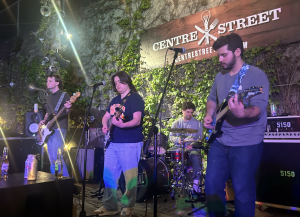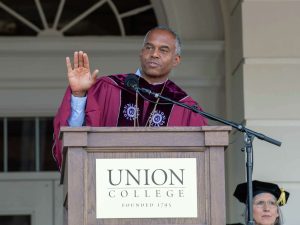5 Takeaways from Professor Stephen Berk’s Lecture on “Ukraine, Russia, and the Jews”
October 6, 2022
Saturday, October 1, Professor Berk led a lecture/Q&A event titled “Ukraine, Russia, and the Jews.” The event was hosted by the Union College Hillel in the Nott Memorial and introduced by Hillel co-President Peter D’Agata ‘25. The talk drew students, as well as alumni who had previously taken Berk’s classes.
- Ukraine runs with Jewish blood: For centuries, the jews have been subject to persecution in what is today Ukraine. If there had been no Holocaust, the worst attacks on jews in the twentieth century would have been in Ukraine from 1918-1920. The yellow and blue flag of Ukraine has been used by Banderists as auxiliaries of Germany during World War II. But societies change. Germany’s support for Israel would have been unbelievable in times past. Jewish tradition holds that one cannot hold the grandsons responsible for the crimes of their grandparents. But Russian aggression must be stopped, or else there will be aggression in other parts of the world like there was in the 1930s.
- The expansion of NATO: Despite the naked aggression of the Russian invasion of Ukraine, the expansion of NATO is certainly an issue for Putin. But, it seems likely that the invasion would have occurred with or without the expansion of NATO. In 10 years, the expansion of NATO east of Germany may be seen as a historical error. Zelensky’s position, that of full Ukrainian geographic integrity and accession to NATO, may become a sticking point in peace negotiations as it is unclear if Ukraine will be able to achieve the massive success they need. The expansion of NATO has come into conflict with Putin’s desire as an officer of the KGB to see the recreation of the structures of the USSR.
- Russian persistence may be matched by US support: The material support and intelligence capabilities of the United States has been a boon for Ukraine’s defense. The United States, despite their limited involvement in the war, have been able to use their intelligence to bolster the cause of Ukrainian defense. NATO and the EU have remained intact despite the trial the invasion has caused. It’s likely the war will grind on, but it seems likely that NATO and President Biden will continue to support Ukraine.
- Russian anti-war sentiment is growing: The general Russian population is becoming more aware of the economic isolation of Russia as a result of sanctions. As a result of this, there are now protests in the street, acts that require immense courage. Elite opinion is still more contented with Putin, but they are losing avenues to spend their money. Putin is the architect of the oligarchy system and the fortunes of the elite are tied to Putin. While the odds of Putin being overthrown are remote, they are greater than they have been. Putin is not Stalin, and there is no gulag, but it is still a dictatorship. Putin is a ruthless and cunning man who knows that if he loses the war, then he’s done. Negotiation is therefore less likely, but not impossible.
- The odds of nuclear conflict are remote: The odds that nuclear weapons will be used are remote, but nowhere near as remote as they have been. The recent referendum in the East of Ukraine may be used to claim that Ukraine is attacking Russia. While that rationale may not be accepted in the West, it may be accepted in Russia.






